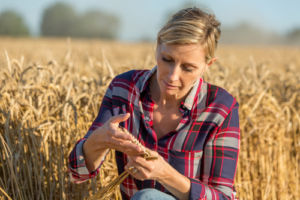Ireland’s farmers are leading a mobile revolution. Gráinne Byrne takes a closer look at the apps that are changing the lives of Irish farmers for the better.
What are the best apps for Irish farmers, apps that save real time and money?
First up is the giant in the Irish farming community, DoneDeal. Although the transparency of the traditional auctioneering process still appeals to many farmers, DoneDeal has confirmed that goods and services to the value of more than €28 million were sold through the farming section of its mobile app in 2015. Livestock alone amounted to €22 million of that figure. Economist David McWilliams describes this mass retail movement as a sort of ‘cyber-bazaar’, in which we have seen huge growth – an indicator of increased trust, by Irish farmers, in digital markets and mobile apps.
DoneDeal’s first farming report in 2013 revealed that out of the 9,000 farm ads published on the platform every month, 20% were placed from iPhones, and 33% were sent from Android smartphones, which is proof that the farming community is increasingly mobile and digital savvy.
“I think we’re on the crest of an agri-tech wave, and from a sustainability perspective, if we don’t adopt new technologies, we’re going to struggle.”
Banking
Banking apps have simplified and sped up the payment process for farmers. Enniscorthy dairy farmer Aidan Murphy talked to ThinkBusiness about the practicality of banking with his mobile. “First of all, my banking app is simple and straightforward to set up and use. People are naturally cautious about giving card details over the phone, and now you can avoid that. Recently I went to pay a guy, and all I needed were his BIC and BAN numbers. I verified it by text, and he was paid in a matter of minutes.”
Murphy also highlights the transparency and convenience of the banking app he uses. “You can see exactly how much has been lodged or taken out of your account. It’s also handy because you don’t need to go to your house to write a cheque or go to the bank in town. It’s all in your hand.”
Cattle farming
Apps that help and add real value to cattle farmers have also experienced a massive uptake since their launch. Dairymaster’s MooMonitor is a small device that hangs around a cow’s neck and senses changes in the animal’s behaviour. The farmer is then notified if the cow is in heat or ready for milking by app notification or SMS.
According to Teagasc research, the economic cost of a missed heat is approximately €250. The MooMonitor intends to minimise that potential loss by keeping a close on the cattle’s fertility cycle, which is highly significant for milk production.
Moocall is a calving sensor device, this time; it is placed on a cow’s tail, which notifies the farmer one hour before calving. It gets rid of the hassle of always having to check CCTV or visit calving sheds, while also ensuring that both calf and cow are looked after in the event of a difficult birth.
Alanya’s HerdInsights is a heat detection and health analysis solution app connected to a collar on a cow. The cow’s behaviour is analysed by a multi-metric system, and farmers can gain heat detection rates of up to 97%. In addition to heat detection, HerdInsights also provides an insight into an individual cow’s health status which allows for early detection of health problems such as ketosis and mastitis, and intervention at subclinical stages.
Farm compliance
When the tractor seat is also your office chair, record-keeping can become a reduced priority and updating the books may become a nightmare task by the end of the year. However, with farm compliance apps such as Farmflo and Herdwatch, both crop and livestock farmers can conveniently record details on their smartphone in the field, so all boxes are ticked when inspection time comes around.
The Farmflo Agronomy Tool is a new product from Farmflo, providing Agronomists with a tool to make observations and recommendations on crops from the field. The ability to share their information in real-time with their farmer customers creates a digital link, which aims to increase efficiency by providing quality and accurate advice to enhance the performance of crops and profitability for farmers.
The Herdwatch Sales Ring is an extension of the original Herdwatch app and enables farmers to trade animals quickly and safely, with the automatic creation of movement certificates when livestock are moved from the seller to the buyer’s herd.
Optimising soil fertility
Irish farmers spent €565m on fertiliser in 2015, yet only 10% of the soils tested by Teagasc were of optimum fertility. Over the last two years, Teagasc has been developing NMP-online, a nutrient management package to provide farmers with the relevant information in the form of maps to increase fertiliser efficiency.
By the end of 2017, it is hoped that more than 50,000 farms will be utilising the package to improve fertiliser usage. It seems appropriate that with all this soil fertility data being generated, that it should be integrated seamlessly into apps that can easily be used by farmers and agronomists, and in turn, help to drive the usage of apps on Irish farms.
EU animal health law
One very positive step towards increasing the digital documentation of herd health is the EU Animal Health Law, which was passed in March. Sinéad Quealy of VirtualVet remarks how it “supports a drive towards the near real-time capturing of information, through technology.” One of the law’s primary objectives is to increase early detection of and the control of animal diseases, including emerging diseases linked to climate change. It also aims to reduce the occurrence and effects of animal epidemics.
Quealy says that it will also serve as an impetus for a re-think by the state agencies responsible for food safety and “utterly change for the better how farm records are kept in this country”.
Tommy Heffernan of Co-Farm has been working as a vet for 15 years, and says that he has witnessed a massive transformation in veterinary medicine: “We’re doing more herd based medicine nowadays, as well as continuously using more data to make better decisions.”
Heffernan claims that this a result of changes in legislation and because farm sizes are increasing.
“I think we’re on the crest of an agri-tech wave, and from a sustainability perspective, if we don’t adopt new technologies, we’re going to struggle.”
App helps farmers prepare for rainy day
A part-time farmer from County Clare has developed a unique weather app tailored for Irish farmers.
FarmHedge, a free smart-phone app, gives farmers on-farm alerts directly relevant to farming activities.
“The weather alerts are unique to the farm location, and they relate short-term forecasts to the ten-year normal for that area to provide information on grass growth, animal health risks and other farm activities,” says Dr John Garvey, senior lecturer in risk management and insurance at the University of Limerick, who created the app.
“I wanted farmers to have highly local and accurate weather information that gives them a snapshot of what will happen over the coming days. We’re using the best forecasting model available (called the ECMWF model), and we relate that forecast to the ten-year typical weather for that location,” says Dr Garvey.
“We will be introducing a system that helps farmers protect against the cost of inclement weather. If your farm experiences wetter or colder conditions than are average for any period then you may have to use a higher volume of concentrate feed to supplement low dry matter production,” says Garvey.
“We are exploring ways in which feed can be booked via the app with farmers benefiting from deep discounts on their feed bill if weather conditions are worse than average. The idea of transferring the costs associated with adverse weather is common in other weather-sensitive industries like energy and marine transport. I want to bring these benefits to Irish farmers to help stabilise farm incomes.”
This post was originally published here - https://www.thinkbusiness.ie/articles/apps-for-farmers/ on

















